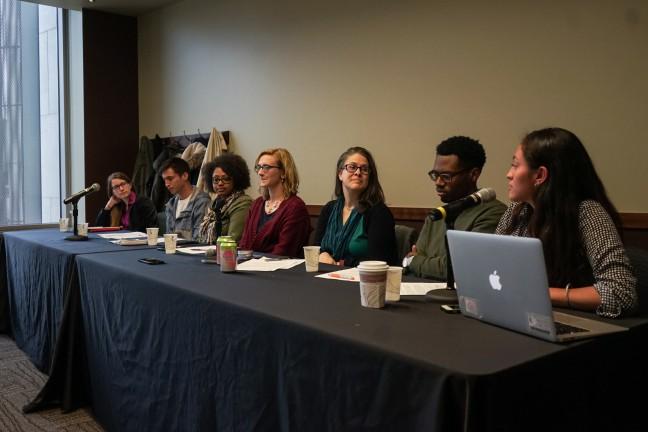A collaboration between The Badger Herald and Promoting Awareness Victim Empowerment kicked off Sexual Assault Awareness Month with a panel discussion Monday night on ending sexual assault at University of Wisconsin.
The panel, consisting of six experts and activists on sexual assault, discussed the current investigation into UW’s handling of sexual assault cases, and how the university can broaden its scope and understanding of sexual assault to prevent it from occurring in the first place.
University of Wisconsin under federal investigation for handling of sexual assault cases
UW is currently one of 173 U.S. colleges and universities that federal authorities are investigating for the handling of sexual assault complaints, SurvJustice staff attorney Myka Held said. SurvJustice is a national not-for-profit organization focused on achieving justice for survivors of sexual violence.
In most Title IX investigations, Department of Education investigators negotiate a resolution agreement for schools or universities in violation of federal law so they do not lose their federal funding, Held said.
Typically, these negotiations include policy changes for more campus awareness.
Held added that universities can improve their handling of sexual assault cases by better meeting Department of Education standards.
“I think schools have to want to work with the government,” Held said. “Right now … the UW school system in violation of Title IX because they allow respondents to appeal a decision but not complainants.”
Carmen Hotvedt, manager of Violence and Victim Advocacy at University Health Services, viewed sexual assault investigations as a survivor’s positive exercise of civil rights — not as bad publicity for universities, as many perceive, she said.
Survivors can use a federal complaint to investigate their perceived injustice — an opportunity Hotvedt said she welcomes when students feel like their right to a discrimination-free education is in question.
She said she hopes the outcomes of these investigations help improve UW’s response to sexual assault cases.
“I don’t always know that it’s a negative thing to have these civil rights investigations,” Hotvedt said. “It means that students came forward and said, ‘This isn’t okay, and help me address it and help … make the campus better.”
Valyncia Raphael, a conduct coordinator in the UW Office of Student Conduct and Community Standards, said universities must take the first steps in preventing sexual assault, instead of waiting to act until survivors come forward, or federal funding comes into question.
“A university will only change their policies unless their federal funding is dangled in front of them,” Raphael said. “We’ve got to stop that because it’s the right thing to do and our students are suffering in silence.”
‘Finally taking action’: Greek community to implement first major plan to address sexual assault
Multicultural Student Center Associate director Robert Brown said UW needs to acknowledge its party school reputation and that it plays a role in addressing sexual assault on campus.
Alcohol is the number one date rape drug and a big facilitator in cases of sexual assault, PAVE Chair Sophie Nielsen said. Instead of calling for abstaining from alcohol, UW and other universities should highlight the ways that alcohol can be used to take advantage of others, she said.
Nielson recalled how at UW’s incoming-student orientation, students were taught how alcohol is often involved in sexual assault cases and how students shouldn’t drink because it is “evil.” She said a better approach would be for house fellows to promote constructive conversations about alcohol rather than simply writing students up.
Brown said the university’s current “shaming” stance on alcohol is ineffective. Instead of focusing on encouraging students not to drink, the university should focus on the motivations behind drinking.
He said heavy drinking on campus has become the norm, especially among males, who are especially pushed to drink because of stereotypes of masculinity.
“If I drink less, that makes me less of a man, which is inherently misogynistic and sexist,” Brown said.
Anders Kristensen, president of We’re Better Than That: Men Against Sexual Assault, said UW needs to provide more education on prevention specifically geared toward students.
But he added that the student body is responsible as well. Male students in particular, he said, must acknowledge that sexual assault is a large problem on campus.
“I think it’s very important that we realize this is a student problem,” Kristensen said. “It’s not a problem in administration. The effects that are felt are around campus, those are students that feel these effects, and it is also students that are committing these crimes.”
Brown said discussions help create an atmosphere of mutual support where students can learn how to properly handle and prevent sexual assault.
“That whole notion of asking for help tends to be a huge barrier,” Brown said. “Thinking about some of those root causes and how that perpetuates this same cycle is something that I would offer to this conversation.”














